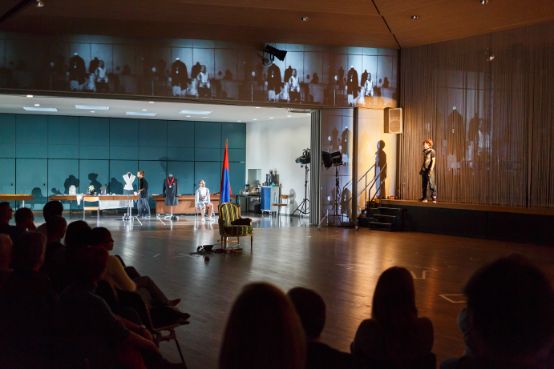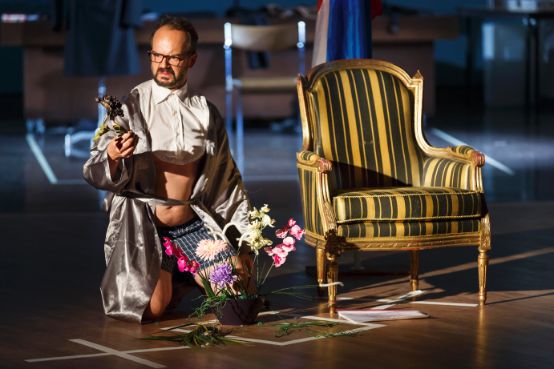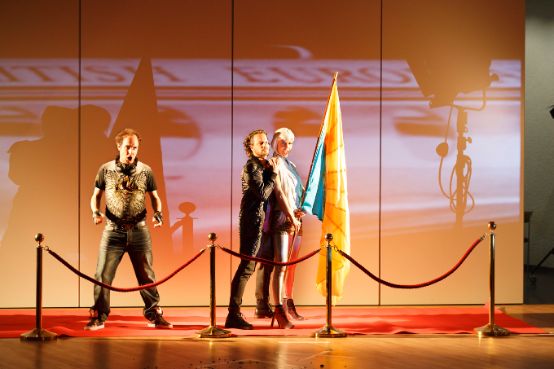The power of images - the power of sound
Daniel Mouthon's opera "Liquid Crystal Display" is about love, intrigue and death in a world of media manipulation. It was performed in the Hottingen parish hall from October 17 to 23.

Where Zurich is concerned with non-operatic, non-narrative musical theater, Daniel Mouthon has attracted attention in recent decades with his continuous and innovative theater work. The singer, who was born in 1952 and became known for his acrobatic vocal skills in the 1980s, has regularly presented extraordinary projects that deal with socially critical and political approaches: plays based on James Joyce or Marcel Duchamp (or next year, for the anniversary, Dada). They are characterized by a discursive examination of texts and theories, of art in general - making him a forerunner of the discourse compositions that Patrick Frank presents today. Such compositions are no longer content with writing sounds, but aim to trigger a discussion about art and its role in the world.
-

- Photo: zVg
- Daniel Mouthon
The utopian in music theater is therefore of central importance to Daniel Mouthon: not as something aloof, but as something accessible. Mouthon's most recent work in this field seems unusual, because Liquid Crystal Display is a genuine, almost traditional opera, narrative, with singers and chamber orchestra, almost entirely sung and through-composed - and without breaks. There are no theoretical interpolations, no reflective meta-levels, no intermezzi. Everything is integrated into the libretto, which was written by Zurich writer and journalist Daniel Suter. And Mouthon, who otherwise often sings along and is at least involved in the direction, has withdrawn completely into the role of composer and producer.
Opera emotions drive
The opera is about a state president and a sect-like popular movement with a charismatic leader, about institutionalized media and open social media, about intrigues and falsified media images. Whoever has power over the images decides. Personalities, as we know them from the news, are reflected in the characters. In fact, it is a plot that suits the opera well - and yet speaks to our times, because Mouthon brings together musical theater and the modern world and poses the questions of our time in the opera, discursively, but also in a sensual way. Liquid Crystal Display is a parable of a democracy that is changing in the age of total medialization.
-

- Photo: Martin Stollenwerk
- Robert Koller (bass-baritone) sang a double role as President P and Transmitter T
The paradox of the play is that, although it tells of the omnipotence of the media, the meaningfulness of the work lives far more from the good old operatic qualities of love, emotion, jealousy, power and intrigue than from the all-dominant media technology. It may be that the venue, a parish hall, is too sober after all and that the technical and financial possibilities were too limited to portray the overwhelming technology in its survival size. The strength of the work lies in its emotional depth, both musically and in Stefan Nolte's staging, which manages almost entirely without a stage set. Mouthon draws on the "powerhouse of passions", as Alexander Kluge once called opera: Artistic singing is able to heighten emotions; it expresses what is deep inside people and might remain hidden there. Music is a trigger, and Mouthon wants to bring this elite art form closer to the reality of our lives.
-

- Photo: Martin Stollenwerk
- From left to right: Chasper-Curò Mani (baritone) as Boss of Media Group B, Daniel Bentz (tenor) as Agitator A and Catriona Bühler (soprano) as Golden Master M
Feelings make you stumble
This power or driving force can be felt everywhere in the music. The mini-orchestra - the Ensemble für neue Musik Zürich under the direction of Sebastian Gottschick - does not so much carry the singing as drive it. In the first two acts in particular, this music is restless, it repeatedly contains familiar elements, but they shoot past us so quickly that it is almost impossible to hold on to them, nervous, obsessive even. This also makes the introduction somewhat difficult, because in the over-acoustic hall, the music and the vocals penetrate the listener very directly. The comprehensibility of the lyrics dwindles, there are too many impressions - probably deliberately so.
-

- Photo: Martin Stollenwerk
- Franziska Andrea Heinzen (soprano) as Creative Designer C
A committed vocal ensemble is on the move with Robert Koller as President P, Catriona Bühler as cult leader M, Daniel Bentz as their chief ideologue A, Chasper-Curò Mani as media boss B and Franziska Andrea Heinzen as creative designer C. And it is this last character who really makes the play unfold. Initially, we see her in a subordinate administrative role at the media group. However, her former love for A brings feelings into play that thwart B's game of intrigue. Her confrontation with M in the fourth and final act is the climax of the almost two-hour work. When C harasses M there, her singing falters and then erupts all the more violently: the notes become killing arrows. That is magnificent. This shows how much Mouthon composes from the voice, from its physicality. Indeed: the "powerhouse of passions" is, unexpectedly in this particular place, of enormous effect.
-

- Photo: Martin Stollenwerk
- The large-scale video projections by Georg Lendorff played a central role.








